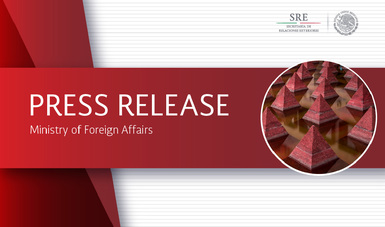At the Conference on Electoral Integrity in Latin America convened by the Kofi Annan Foundation and inaugurated today, the National Electoral Institute (INE), Foreign Ministry (SRE), Electoral Tribunal of the Federal Judiciary (TEPJF), the Special Prosecutor's Office for Electoral Crimes (FEPADE), the Mexico City Electoral Institute (IECM) and the Latin American and Caribbean Parliament (PARLATINO) agreed on the need to strengthen democracy in the region.
At the conference's inauguration, INE President Lorenzo Córdova; Foreign Secretary Luis Videgaray; Alan Doss, Executive Director of the Kofi Annan Foundation; TEPJF Judge Monica Aralí Soto; FEPADE head Santiago Nieto; Blanca Alcala, Alternate President of PARLATINO; and IECM President Mario Velázquez said that in today's Latin America, dialogue between countries and democratic institutions is key to addressing the challenges to democracy in Latin America.
INE President Lorenzo Cordova Vianello said that 12 of the region's 19 countries will hold elections and that everyone needed to help ensure that holding genuine elections becomes the main way of distributing political power in Latin America.
He warned that authoritarianism and the autocratic exercise of power are still with us, expressed as simulated institutional changes that encourage electoral manipulation.
"Political parties and actors are not being sufficiently sensitive to the harm that corruption and impunity and systematic attacks on electoral authorities are having on spreading democracy as the main civilizing mechanism of modern societies," he said.
Foreign Secretary Luis Videgaray said that "by adopting the Inter-American Democratic Charter in 2001, the countries of Latin America and the Caribbean accepted that democracy is the form of government that must prevail in our region."
Therefore, he added, "we must raise our voices when it is threatened or not respected in other parts of the continent." Last week in Lima twelve countries of the region expressed our great concern about the situation in Venezuela, where a Constituent Assembly that we do not recognize has been elected and demonstrations have been repressed in a deplorable setback.
In a video message, Kofi Annan emphasized that "with at least 10 important elections in the next 18 months, Latin America is at a crossroads. This conference should bring together all those who, like us, want to strengthen democracy and elections with integrity throughout the region and beyond."
FEPADE head Santiago Nieto said that although the democratic transition was behind us now, "society is becoming more demanding every day, forcing us to rethink electoral models. We have to be critical of what we have and improve the quality of the democratic system."
The issue of electoral integrity, he said, leads us to review bad practices and crimes such as electoral embezzlement and the use of illicitly-gotten resources. Corruption begins with electoral offenses. And violence against electoral institutions and political violence against women must also be fought against.
TEPJF Judge Mónica Aralí Soto Fregoso said the exchange of ideas and lessons learned is vitally important in identifying the progress made as well as possible setbacks in electoral integrity.
"The comparison of good practices is necessary for the operation of solid democratic institutions, the shaping of a more active citizenry, and women's empowerment in politics," said Soto Fregoso at the inauguration on behalf of TEPJF President Janine M. Otálora Malassis and the Superior Chamber.
Judge Soto Fregoso stressed that electoral integrity seeks ethical and politically accepted codes of conduct; fair, inclusive and egalitarian legal frameworks; clean, transparent and impartial elections; the political freedom to participate freely and equally; a climate free of threats and violence; and mechanisms that safeguard integrity and ensure accountability and full application of the law.
Ambassador Blanca Alcalá, Alternate President of PARLATINO and Ambassador of Mexico in Colombia, stressed that the forum on electoral integrity highlights one of the key issues for strengthening democracy in any nation of the world, especially the Latin American and Caribbean countries.
Electoral integrity entails three key elements: free, regular and competitive elections. The foundation of democracy is made up of electoral integrity, which is the starting point and condition for renewal of democracy itself.
The President of the Mexico City Electoral Institute (IECM), Mario Velázquez Miranda, said the model of electoral integrity, based on international standards, will be useful for detecting, preventing and eradicating the bad practices that arise in the various stages of every democratic process inside and outside the country, but that there are challenges to face.
"Much remains to be done, given the challenges created by the rapid developments in information technology, the globalization of the economy and the automation of banking processes for the transfer of resources.
"Particularly in relation to issues such as illicit campaign financing, the auditing of resources, the persistance of laws that do not prevent and sanction all the improper practices that may be committed in spreading false information on social media, and media bias during political campaigns," he said.
The conference on electoral integrity in Latin America being held on August 14-15 will enable the participants to compare their challenges and exchange best practices in order to strengthen electoral integrity in the region and to support democracy through peaceful transitions accomplished with integrity in Latin America.
